Trump’s Decision To Leave Reagan-Era INF Treaty Is A Foolish Mistake
President Trump is preparing to scrap a thirty-year-old treaty that marked the beginning of the end of the Cold War. It would be a foolish mistake.
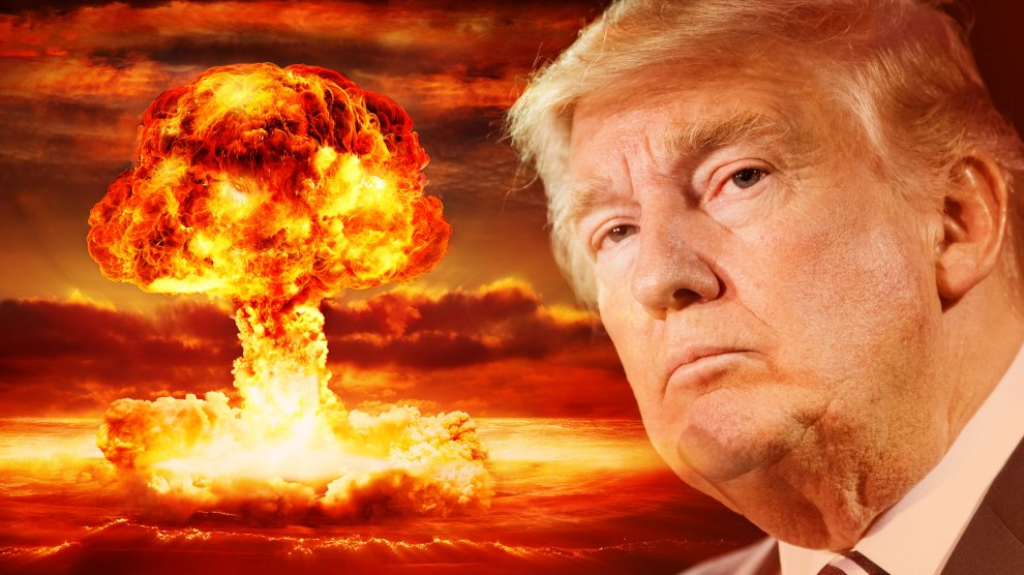
The United States is preparing to inform Russia that it is leaving the Intermediate-Range Nuclear Forces (INF) Treaty, an agreement reached by President Reagan and Soviet leader Mikhail Gorbachev that is widely seen as the beginning of the end of the Cold War and which led to broader nuclear arms reduction agreements between the two powers:
The Trump administration is preparing to tell Russian leaders next week that it is planning to exit the landmark Intermediate-Range Nuclear Forces Treaty, in part to enable the United States to counter a Chinese arms buildup in the Pacific, according to American officials and foreign diplomats.
President Trump has been moving toward scrapping the three-decade-old treaty, which grew out of President Ronald Reagan’s historic meeting with Mikhail Gorbachev in 1986. While the treaty was seen as effective for years, Russia has been violating it at least since 2014 in an effort to menace other nations.
But the pact has also constrained the United States from deploying new weapons to respond to China’s efforts to cement a dominant position in the Western Pacific and to keep American naval forces at bay. Because China was not a signatory to the treaty, it has faced no limits on developing intermediate-range nuclear missiles, which can travel thousands of miles.
The White House said that no official decision had been made to leave the treaty, known as I.N.F., which at the time of its signing was considered a critical step in defusing Cold War tensions. But in the coming weeks, Mr. Trump is expected to sign off on the decision, which would mark the first time he has scrapped an arms control treaty, the American officials said.
Now that the treaty is largely in tatters, the question is whether the decision to leave it will accelerate the increasingly Cold War-like behavior among the three superpowers: the United States, Russia and China.
As Russia has flown bombers over Europe and has conducted troop exercises on its borders with former Soviet states, the United States and its NATO allies have been rotating forces through countries under threat. Ukraine has become a low-level battleground, with ground skirmishes and a daily cyberconflict. China and the United States are jostling for position around reefs in the South China Sea that Beijing has turned into military bases, and they are both preparing for any possibility of war in space
For the past four years, the United States has argued that Russia is in violation of the treaty because it has deployed prohibited tactical nuclear weapons to intimidate European nations and former Soviet states that have aligned with the West. But President Barack Obama chose not to leave the agreement because of objections from the Europeans — particularly Germany — and out of concern that it would rekindle an arms race.
Mr. Trump appears not to share such hesitation. His national security adviser, John R. Bolton, will warn the Russian president, Vladimir V. Putin, on a trip to Moscow early next week that the United States plans to leave the treaty, the American officials said.
Mr. Bolton declined to comment on his forthcoming trip. But a senior administration official issued a statement saying that “Russia continues to produce and field prohibited cruise missiles and has ignored calls for transparency.”
Defense Secretary Jim Mattis has publicly brought the subject up several times in recent weeks, saying that Russia’s violations were “untenable” and signaling that the administration was reviewing its options. The preparations to leave the treaty were described by foreign diplomats who have been briefed on the matter and by American officials with knowledge of the plans.
In a lengthy nuclear strategy document published early this year, the administration detailed the Russian violations and concluded that the country’s “decision to violate the I.N.F. treaty and other commitments all clearly indicate that Russia has rebuffed repeated U.S. efforts to reduce the salience, role and number of nuclear weapons.”
The Pentagon has already been developing nuclear weapons to match, and counter, what the Chinese have deployed. But that effort would take years, so, in the interim, the United States is preparing to modify existing weapons, including its non-nuclear Tomahawk missiles, and is likely to deploy them first in Asia, according to officials who have been briefed on the issue. Those may be based in Japan, or perhaps in Guam, where the United States maintains a large base and would face little political opposition.
The last time the United States withdrew from a major nuclear arms control treaty was in 2002, when President George W. Bush fulfilled a campaign promise and scrapped the Anti-Ballistic Missile Treaty. While Mr. Trump withdrew from the Obama-era deal with Iran this year, that agreement was not a treaty, and it governed only Iran’s production of nuclear materials. Tehran has no nuclear weapons.
Mr. Bush’s pullout from the ballistic missile treaty led to a buildup of antimissile defenses — still an irritant in relations with Russia. But it also led to a modest arms control agreement with Russia, reducing the overall number of weapons possessed by each country.
But such an agreement seems unlikely to emerge from the demise of the I.N.F. treaty. For cash-constrained Russia, tactical nuclear weapons, along with cyberweapons, are cheap offensive options. Just last week, Mr. Putin, in an annual speech, reported that Russia was preparing to deploy a new hypersonic missile, reinforcing the sense that the long hiatus in the nuclear arms race is over. Such missiles step around current arms control limits.
Mr. Trump himself has not publicly criticized the Russian arms buildup, in line with his generally deferential approach toward Mr. Putin. But he is surrounded in the administration by hawks on the nuclear issue, none more outspoken than Mr. Bolton, and the administration’s decision to brief allies this week on the issue was viewed by key NATO partners as a sign that the decision had been made, even if it had not been formally acknowledged.
“The collapse of the treaty would likely open up a missile race in Europe and elsewhere,” said Hans M. Kristensen, the director of the Nuclear Information Project at the Federation of American Scientists, a private group in Washington. “It would signal a new phase where countries would compete to deploy and counterdeploy weapons.”
President Trump confirmed the withdrawal, while Russia responded by calling the decision a dangerous step:
The risks to global security could be severe if the U.S. pulls out of the landmark Intermediate-Range Nuclear Forces Treaty with Russia, as President Donald Trump has pledged to do, the Kremlin warned on Sunday.
Sergei Ryabkov, Russia’s deputy foreign minister, said a unilateral U.S. withdrawal from the pact “would be a very dangerous step” that would “provoke serious condemnation” from the international community.
Ryabkov also accused the Trump administration of using the Cold War-era treaty to “blackmail” Russia.
“We see an attempt to, effectively, present Russian with an ultimatum,” he said, according to Reuters, which cited Russian media. “We will, of course, accept no ultimatums or blackmail methods.”
The INF treaty was signed in 1987 by U.S. President Ronald Reagan and Soviet leader Mikhail Gorbachev. The agreement required both nations to eliminate land-based short-range and intermediate-range nuclear and conventional missiles.
The treaty “wasn’t designed to solve all of our problems with the Soviet Union,” but “to provide a measure of some strategic stability on the continent of Europe,” former State Department spokesman Rear Adm. John Kirby told CNN.
“I suspect our European allies right now are none too happy about hearing that President Trump intends to pull out of it,” Kirby said
The Russians have also said that they will respond to any decision to pull out of the treaty with new missiles that will “restore balance,” and French President Emmanuel Macron is urging the President not to pull out of the treaty.
Aaron Mehta summarized the situation leading up to this decision in a piece at Defense One:
Rebecca Heinrichs, an analyst with the Hudson Institute, said: “It makes no sense to remain party to treaties of which the United States is the only one complying.”
“Treaties are not ornament pieces to be collected; they’re supposed to be tools that serve U.S. interests. The Russians have been on notice to become compliant for years now. The Obama administration tried to force them to comply and so has the Trump administration,” Heinrichs added. “For Bolton, the tolerance for being treated as suckers is exceptionally low.”
But Hans Kristensen of the Federation of American Scientists believes that leaving the treaty would send a powerful signal to nations like China that developing ground-based cruise missiles is acceptable, signaling “a new dynamic phase where countries would compete to deploy and counter-deploy INF weapons.”
In addition, he worries that withdrawing from the INF goes hand in hand with deploying such weapons to Europe, which could “trigger widespread political disputes in Europe and within NATO. Trump would further divide NATO, rather than strengthen the alliance, and thus grant Putin one of his most important foreign policy objectives.”
“Overall, defense hawks in Moscow and Washington appear to have hijacked foreign policy and thrown the arms control baby out with the bath water instead of trying to repair relations and repair treaties and strengthen international security,” Kristensen said.
Even before today’s news, the U.S. was working to fund research and development on a ground-based cruise missile, a system banned under the INF agreement. The line from the Pentagon throughout 2018 has been that such a weapon would be designed but not deployed, staying with the treaty boundaries while providing a potential threat or trade-off for negotiations with Russia.
The threat of upgraded nuclear capabilities has a public topic of discussion by Pentagon officials as part of a broader negotiation to try and force Russia back into compliance on the treaty.
The INF Treaty was negotiated between Presidents Reagan and Gorbachev in the mid-1980s and signed by the two men at a historic summit meeting in Washington, D.C. that would lead to further arms control agreements in the intervening years leading up to the collapse of the Soviet Union. In many respects, that summit meeting and the INF Treaty is recognized as the true beginning of the end of the Cold War that had gripped Europe and much of the rest of the world since the end of the Second World War, and marked the beginning of a period of good relations between the United States that largely started coming to an end when Vladimir Putin assumed power in Moscow and, most especially, in the past four years since Putin moved to annex the Crimean Peninsula, provide aid to rebels in eastern Ukraine, and send Russian forces to assist Bashar Assad in the Syrian civil war. The Treaty itself was meant to address the buildup of nuclear weapons that had occurred on both sides of the Iron Curtain since the 1970s, beginning with the Soviet deployment of intermediate-range nuclear missiles in Eastern Europe, to which the United States and NATO responded with the somewhat controversial deployment of Pershing II missiles in Western Europe. The treaty, which impacted all land-based missiles with ranges between 500 and 5,500 kilometers (310-3,420 miles), ultimately resulted in all of the NATO Pershing II’s, and Soviet SS-20’s, being removed from Eastern and Western Europe respectively.
In recent year dating back to the Obama Administration if not earlier, the United States has asserted that Russia is violating at least the spirit of the INF Treaty with respect to its deployment of missiles in western Russia. Instead of taking action such as what the Administration is apparently about to undertake here, though, the decision was made to stay in the treaty and work within its grievance procedures to attempt to resolve the dispute. Additionally, to the extent there were allegations of violations, those allegations were not aired publicly in the hope that the matter could be resolved without doing so. Last year, though, the Joint Chiefs of Staff put the issue on the public table when they alleged that the recent test of a ground-based cruise missile cruise missile. More recently, intelligence reports that were also made public have claimed that Russia’s newest effort to develop a cruise missile that would travel at hypersonic speeds would violate the treaty. One of the reasons for such a decision is the idea that withdrawing from one of the landmark Cold War-era treaties would send the wrong signal not only to Russia but also to other nuclear powers that might be tempted to increase their own development of shorter-range missiles, which are especially dangerous because their shorter flight time makes the prospect of a mistake or misinterpretation far more likely. Trump’s decision to reverse that policy opens up the prospect of a renewed arms race that would not benefit anyone.
In addition to the alleged Russian violations of the treaty, the Trump Administration’s decision to withdraw from the treaty is apparently also aimed at China, which is not bound by the treaty and has a fairly good sized arsenal of short and intermediate range missiles with nuclear payloads capable of hitting Russia as well as American allies such as Japan, South Korea, and Australia. However, it’s unclear what that has to do with a treaty that has been primarily successful at keeping nuclear weapons out of the European theater for more than three decades now. This is especially true given the fact that the U.S. possesses several options in countering the Chinese threat, including sea-launched missiles that are not covered by the terms of the treaty at all.
Mikhail Gorbachev, who lives in retirement in Russia, calls the decision to withdraw from the treaty he negotiated “very dangerous,” while Daniel Larison calls it foolish:
The treaty has served U.S. and European security well for three decades. Casting aside a landmark arms control agreement risks starting a new destabilizing arms race with Russia at a time when relations with Moscow are already extremely poor. Withdrawing from the treaty amounts to letting Russia off the hook for its recent violations, and it gains the U.S. nothing except the ability to waste more resources on nuclear weapons that we don’t need. Killing the treaty isn’t going to remedy any of the things that critics complain about. China isn’t a party to the treaty and hasn’t been bound by its limitations, but it is difficult to see why the U.S. needs to be able to have land-based intermediate-range ballistic missiles in East Asia in any case. Giving up on an arms control treaty that has been largely successful for European security because it does not address new developments in another part of the world just creates a new problem without fixing any of the others.
Larison’s argument is largely spot-on. While Russia’s actions are concerning, they are moves that the United States can easily compensate for while still staying within the boundaries of the treaty. The better decision would be to utilize the provisions of the treaty itself to form the basis for a strong negotiating position that would either lead to an expansion of the treaty to deal with the threat posed by ground-launched cruise missiles or result in a much-needed new nuclear arms reduction treaty, something that the current Trump foreign policy doesn’t seem to favor at all. The same is largely true regarding the threats allegedly posed by China, much of which can be addressed while still staying within the boundaries of the treaty.
Outside of these arguments is another issue. Unlike the nuclear deal with Iran, the INF Treaty was ratified by the Senate. As a result, it’s entirely unclear if the President can repudiate the treaty without permission from Congress. Of course, as long as the Senate is controlled by Republicans it isn’t at all clear that anyone would call the President out on what clearly seems to be a dangerous and unnecessary step.

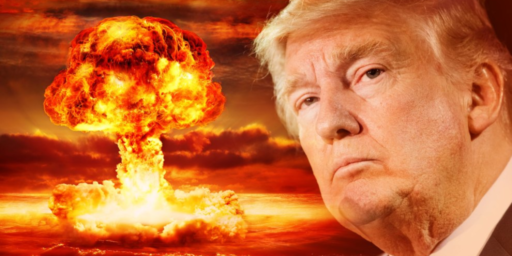
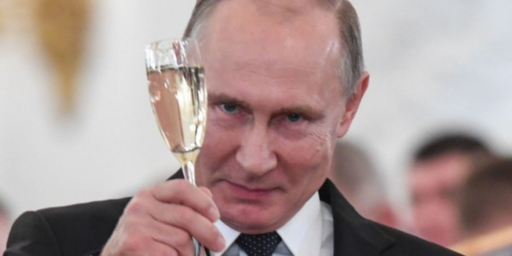
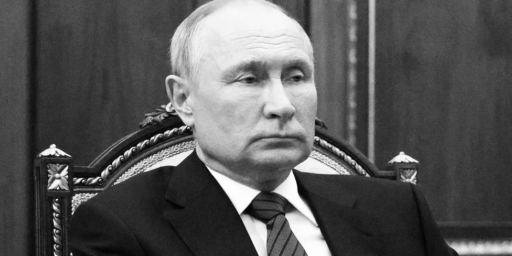
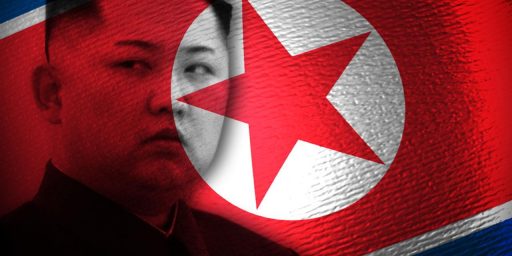

If the Russians are not complying with the treaty — an assessment made by the Obama administration — then I see no reason why we should be bound by it either.
If a more competent administration were doing this, I would expect it would be a negotiating position, designed to bring Russia back to the table, pull in the Chinese and get a stronger agreement explicitly covering the disputed weapons.
China is a rising superpower, with a growing nuclear arsenal and we shouldn’t be negotiating our nuclear position without including them.
All things being equal, I would rather kick the can down the road a few years, so we do have a competent administration handling it. An arms race is a very, very bad idea (just from a command and control perspective, the more nuclear warheads you have, the harder it is to keep them operationally ready but also under strict control).
Ideally, it’s also something the Obama administration would have dealt with before they left office. But, we really can’t blame Obama for not setting up the world to run on autopilot during the Trump administration.
For your headlines do you just have a fill in the blank – “Trump’s decision to _____________ is a foolish mistake”?
@Pylon: Are you pro-arms race?
I was so happy, not to mention relieved, to leave behind MAD, the arms race, brinkmanship, and the rest back in the late 80s…
The very BIG problem with leaving the INF Treaty, is that then Russia has a free hand to plant intermediate range missiles wherever it wants, in however large quantities it wants. It can also cut deals with other countries and place such missiles there.
That’s beside all the issues Doug raised in his post, too.
And it’s a stupid thing to do, as the US, not to mention Russia and China, already have ICBMs that can hit pretty much any target on earth. Oh, and America has a huge carrier fleet where it can, and probably does, deploy tactical nuclear weapons, which can be carried quite a distance by aircraft. The Tomahawk cruise missile, too, can carry nukes as well (that was the whole point of that program), be it launched from shipboard, submarine, ground, or air-dropped.
The three big nuclear powers can destroy the world three or four times over with the arsenals they already posses. Isn’t that enough?
He may bluster and posture, but to me this says Trump’s admitting to having a very small weiner.
I wonder how many inches does he think a nuke will add.
@Gustopher: You can not have been paying attention when the Obama Administration and Congress passed a trillion dollar (almost certainly closer to two before the end) nuclear weapons buying spree and in 2017 a bipartisan trillion dollar increase over the next decade on conventional military forces.
The United States is a belligerent war economy and has been for a very long time.
Where exactly would we be basing IRBM’s to counter China? Taiwan? South Korea? Japan? Good luck getting those governments to play along.
Who does this action threaten most? Western Europe.
Who does this action strengthen most? Russia.
@Ben Wolf:
The US GDP is 19 trillion dollars. The defense budget Trump wants is under 600 billion. That leaves 18 trillion and change that is not defense.
That’s a belligerent war economy?
You’re so up your own ideology you don’t even get it: we can blow up the world with our spare change. All through history war has been limited by the capacity of a king or emperor or national government to pay the crushing costs. We are in the historically unique and genuinely frightening position of being able to kill millions without so much as any American missing lunch.
Well, Doug, “foolish mistake” is Trump’s middle name, so …
As a former physics guy i ponder the Fermi Paradox all the time. (If there are lots of alien civilizations why don’t we see them?) My current standing on the topic is A) Shit’s just really, really far apart. and B) Once civilizations get nukes, designer Ebola viruses, etc, they don’t survive long. We’ve only had nukes for 70 years and almost ended the world several times already.
@Michael Reynolds: Your numbers are incorrect and your nose is dripping.
@Teve:
We really don’t know what the consequences of a global nuclear war would be. But the best estimates don’t look good. Nuclear winter does seem like the likely outcome, and that might wipe out humanity.
In order to know for sure, we’d need to have a nuclear war and see what happens. Or, as Asimov put it int he mid 80s: “We can’t very well say ‘Let’s have a nuclear war and see if we kill off all of humanity or only half’.”
My take on the Fermi Paradox is: the distances are enormous, and the necessary combination of intelligence and the physical means to effectively manipulate the world is very low probability.
As noted above, I think what Trump is pushing for is a reworked treaty, one that possibly includes China. Basically, what he did with NAFTA — bluster, fume, rage, threaten — and then settle on a treaty that’s basically NAFTA with a few long overdue updates. I don’t know, however, that Putin or Xi are particularly interested in a new treaty. And I’m pretty sure we don’t have the people in place to negotiate one, even if they were.
@ Ben Wolf:…your nose is dripping…
You aren’t the class act you think you are.
Most people have a nose that smells and feet that run.
Just read on the bathroom wall that you have a nose that runs and feet that smell!
@Mister Bluster: I care.
@Pylon: Yes.
@Hal_10000:
Considering that nuclear arms, delivery systems, and support troops are very costly, I suspect they are at least interested in not spending a shit ton of money on weapons they don’t ever want to use.
Very little attention has been given to Russia’s Hypersonic missile system: https://www.cnbc.com/2018/07/13/russia-new-hypersonic-missile-likely-ready-for-war-by-2020.html
Ability to deliver a payload at speeds of Mach 8.
So, bad time to get rid of INF Treaty.
its one thing to say the other guy is not playing fair… it’s an entirely different thing to eliminate the negotiation table completely.
@Michael Reynolds: The most significant line in this whole Post is: Who does this action threaten most: Western Europe.
The targets of those Intermediate Range nukes are American military bases.
Pause to think about that….
If the Russian missiles become a permanent feature on the EU/NATO border the obvious solution for Europeans is to demand that those bases get the hell out of their countries. And not just huge crowds in streets as we saw in the 1980s. That would be the obvious choice for politicians in Europe.
America FIRST!
Thank you, Republicans. (We are SOOOO screwed.)
Every country, nation, tribe, clan, band, etc. that has ever existed, has always put its interests ahead of anyone else’s. That’s mere human nature. We can expect this trend to continue indefinitely.
What began to change in the aftermath of WWI, was the realization of how destructive, wasteful, and downright terrible war had become. An attempt was made, therefore, to set up a multinational system to prevent future conflicts. We know that didn’t work out at all.
Rather than abandon the notion, Roosevelt and Churchill, and to some extent Stalin as well, began to set up an international order even before WWII was over. Unlike the previous attempt, this one was far more wide in scope. Not only the United Nations, but a lot of other institutions that bound nations together through treaties, multinational organizations, and trade.
Conflict and war didn’t end. But war between the great powers has not taken place since 1945. And war between such powers today would be far more destructive, wasteful and downright horrible than WWII was.
The international order wasn’t built by 1945. It began to get built in 1945. It’s been building ever since. Every country still holds their own interests above everyone else’s, but now there are also shared interests and endeavors. And trade.
No, the system isn’t perfect. yes, it has created new problems while solving others. It may even have made some problems worse. But it has also kept the peace. It’s too easy to take the bipolar world of 1945-1990 as “normal.” But it was an odd period, and it wasn’t all that bipolar even. China and the USSR proved communism to be merely a political system, not a bond of love and unity between all peoples.
Cant he system be improved? Of course. Many constantly try to do just that. can it ever satisfy everyone? Almost certainly not. But what won’t help is some ignorant, intellectually lazy, petty man well over his head tearing treaties and institutions to satiate his vanity and flatter his supporters.
This move benefits Russia.
Quid, meet Quo.
@Ben Wolf:
The numbers are correct, as you know well. If you don’t, check the Google. So you made a stupid statement, a statement driven not by facts but by your tired Marxist ideology, and when called you lie about the numbers – as inexplicably as a Trumpie – and offer a cryptic insult. Is it an insult, or were you just drunk? I wasn’t sure.
One thing I am sure of? A 19 trillion dollar economy is not defined by an expenditure of about 3% of that total. Add in the 70 billion in annual arms sales and it’s still not even close. The US does not have a belligerent war economy, it has a service economy, but I suppose that’s insufficiently dramatic for you. It doesn’t make for much of a slogan.
Ideology, the great crippler of young minds.
@Gustopher:
No, I am pro-intelligent foreign policy and not knee jerk reaction. No treaty is more pro-arms race than none at all. If the current treaty isn’t being honoured, enforce it. If it’s not good enough, amend or replace it.
@JohnMcC:
Indeed. Our bases, and by extension the voters of Western European countries, and NATO. If we place IRBMs in Europe – where? Maybe Poland? – the Russians will have a perfect rationale for their own, and their logic will be that while the US and Russia both have ICBMs and SLBMs capable of devastating home territories, we will have added additional capacity, a destabilizing capacity, to strike Russian targets. It’s about 1200 km from Warsaw to Moscow.
@Donna Simmons: “Do you ever add anything constructive to a conversation?”
Says the man who was so roundly mocked on this site for constantly spamming with off-topic messages that he had to run away and come back “disguised” as a woman.
No wonder you’re a Trump fan.
@wr:
Bung, the cross-dressing troll for Trump.
@Michael Reynolds: You are, as always, factually incorrect, and you have only the white powder and your inability to correctly utilize a search engine as excuse for your own ignorance.
Drip…drip…
@Donna Simmons:
I’m sorry. Should I have offered an estimate of how many billionths of an inch the Orange weiner is expected to grow with each additional nuke mounted on an intermediate range delivery system?
@Ben Wolf:
Um. . . no. If the numbers were seriously wrong, you’d correct them. You have not because you cannot.
As for the notion that I use cocaine? What? Dude, I smoke pot. I smoke pot every day. I also smoke cigars, drink whiskey and take the occasional Adderall for work. But the last time I sampled coke was in a post-burglary fck-fest involving two of my alleged ‘all girl gang’ in the Mark Hopkins hotel in San Francisco. That’ d be 1978. I didn’t like the way I felt the next day, and I didn’t much enjoy the high.
@Michael Reynolds: Oh…Michael…sweetie.
I can’t fix your screwups for you. I can’t even stop you from being a continual source of misinformation springing from existential rage and arrogant presumption.
Doubling down on a falsehood reminds me of someone. . .
@Ben Wolf:
Right, Ben. Whatever it takes to soothe your fragile ego.
@Michael Reynolds: Aww, poor little fella.
@Donna Simmons:
I see J-enos is back.
Moderators?
Bolton has rejected Russian requests to stay with the treaty.
https://www.washingtonpost.com/world/europe/bolton-faces-moscows-dismay-amid-us-pledges-to-withdraw-from-nuclear-pact/2018/10/23/b2f9f718-d63c-11e8-8384-bcc5492fef49_story.html?utm_term=.059379c9c562
Again, I would feel a lot more confident is the folks in charge here weren’t complete idiots who have failed everywhere — North Korea not only beat Trump, but made him think that he had won.
That said, I would want any administration to be playing hardball with this if they are addressing it. Alas, I expect that this administration is more excited about creating new nuclear toys than they are are the chance to renegotiate the arms deal to address new concerns.
What’s the opposite of cautious optimism? All concrete steps so far are reasonable, but I have zero faith in their ability to do anything other than make a situation worse.
On the other hand, it isn’t a great negotiating tactic if you can see right through threats to pull out.
@Daryl and his brother Darryl:..Moderators?
Re: Donna Simmons…I was with Reynolds on Donna being another incarnation of Bungles until you mentioned GeeNose. Whatever.
For sure we have a gender conflicted creature here.
Maybe both of them should present themselves to Texas Johnny Telephone (boys are boys and girls should be chained to the stove at a young age) for whatever regimen of Conversion Therapy* he might be facilitating.
*Spoiler Alert: I hope this offends as many people as possible!